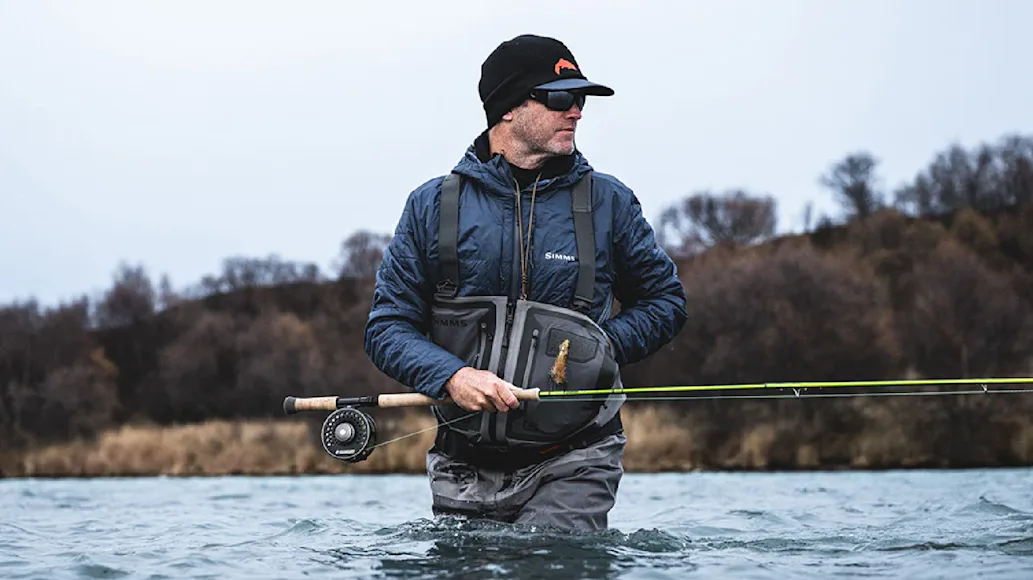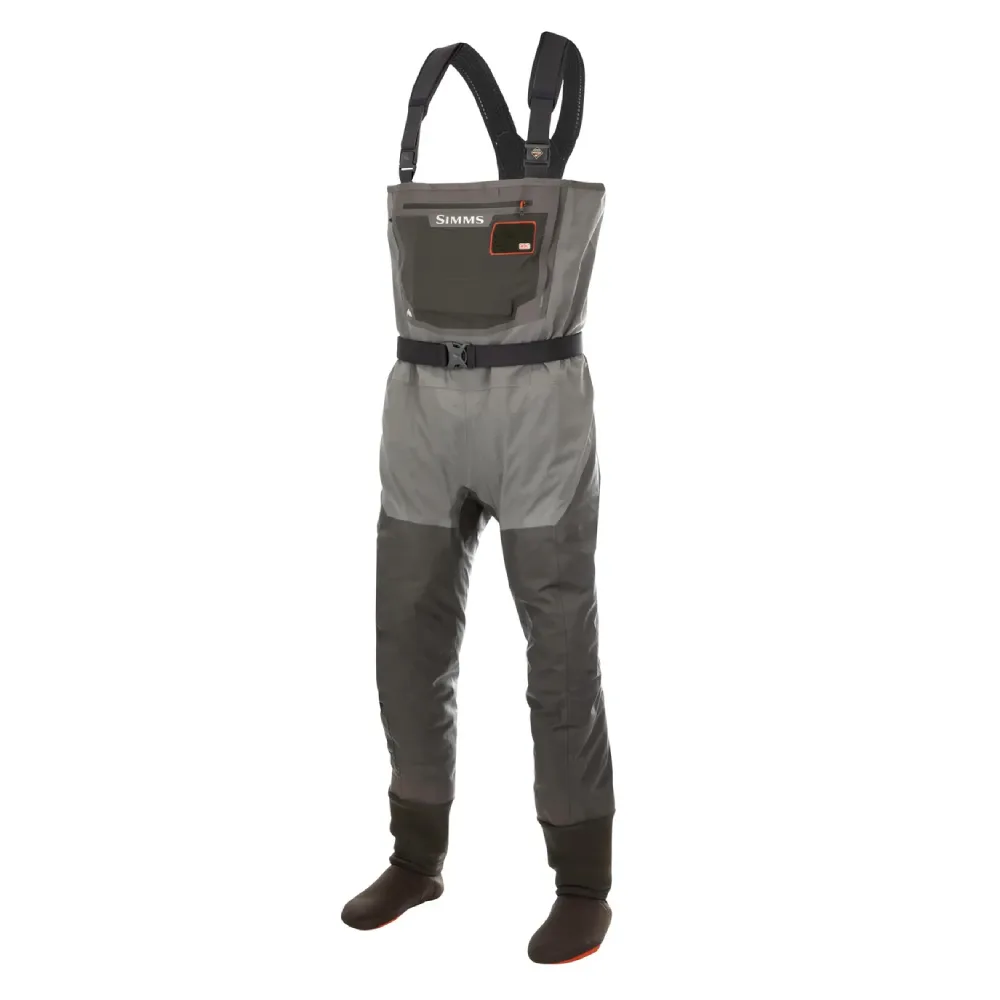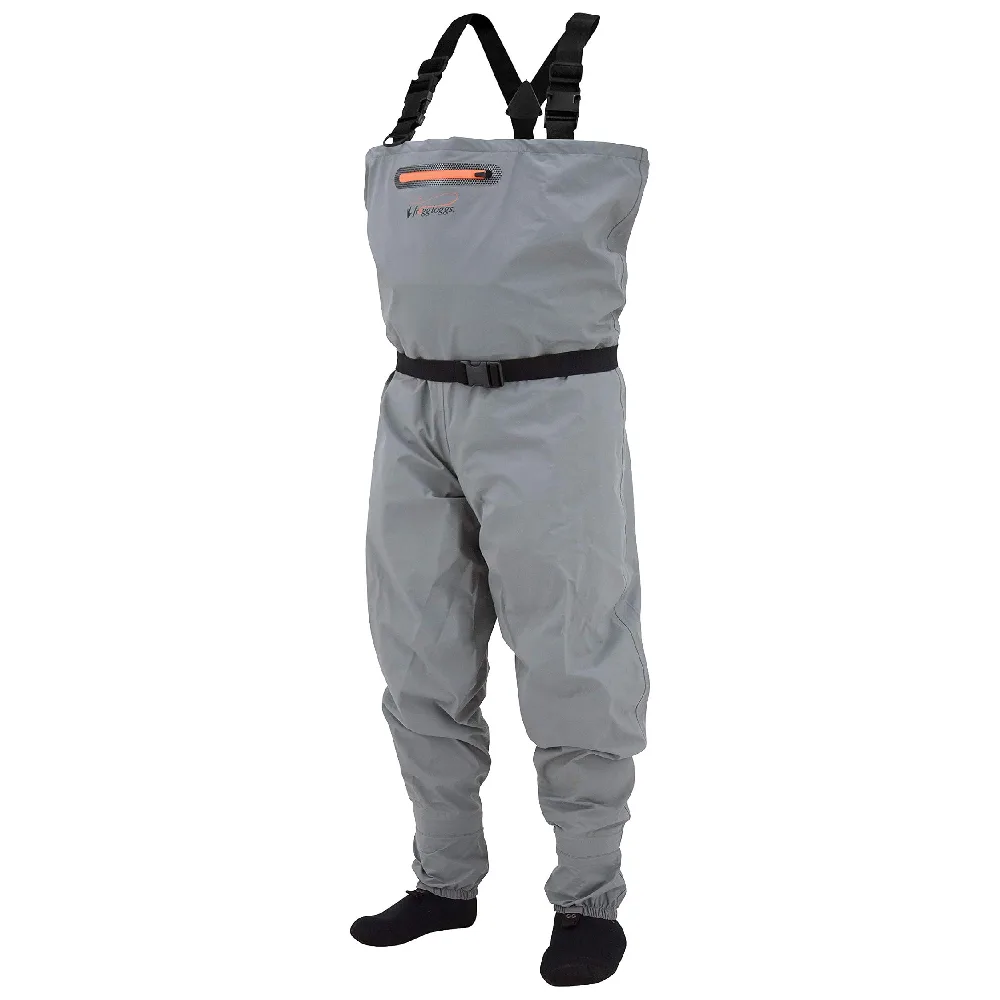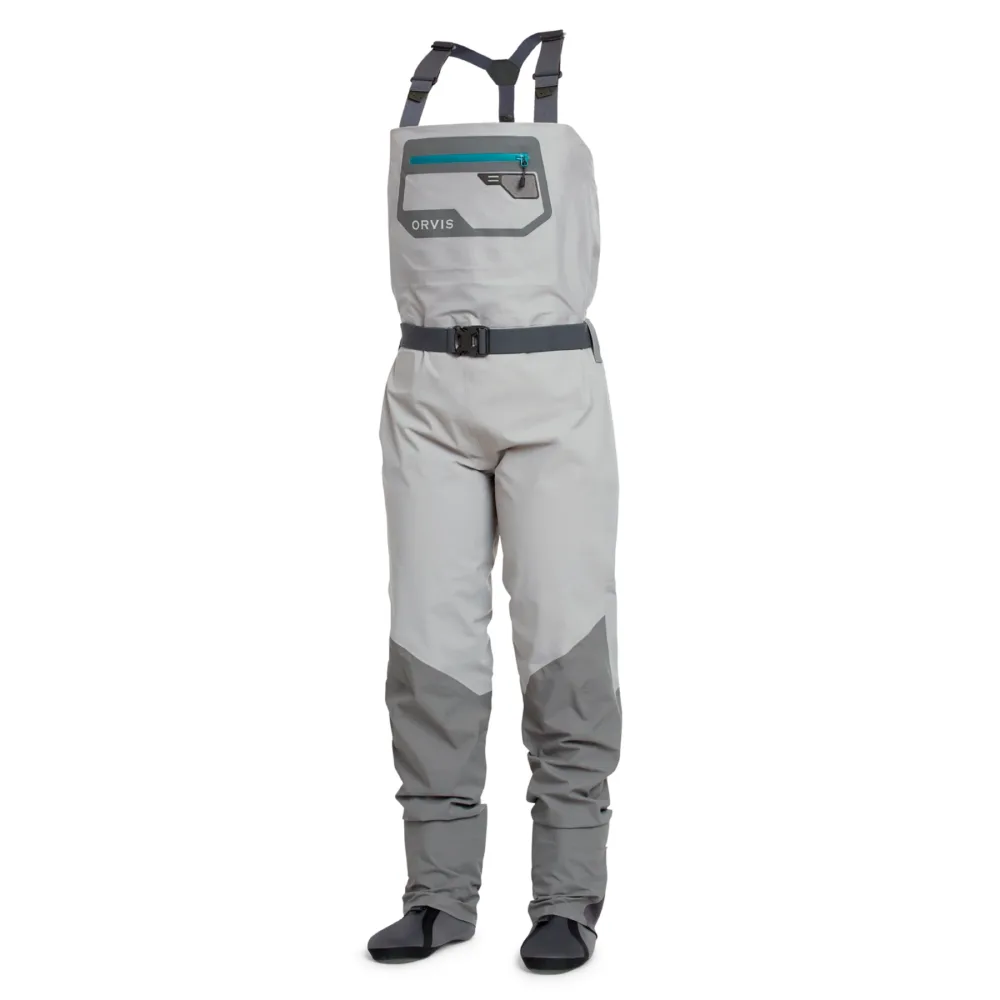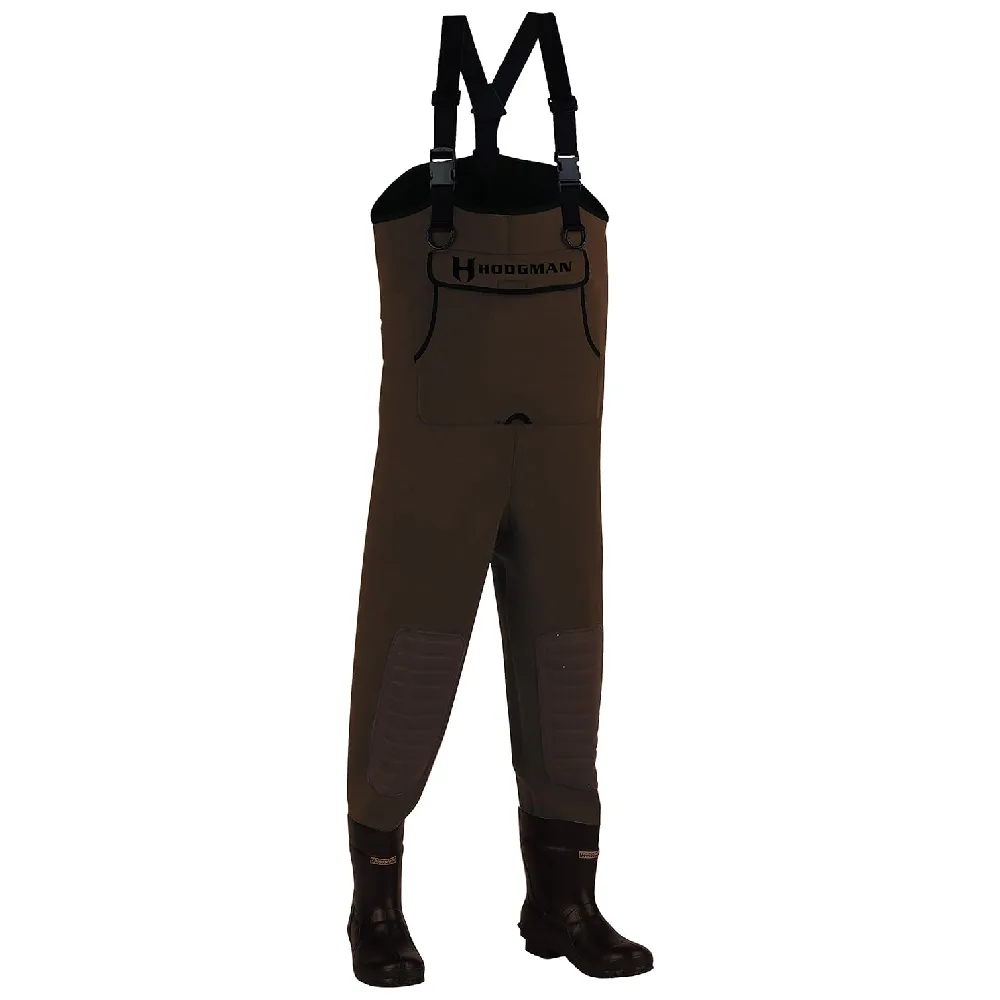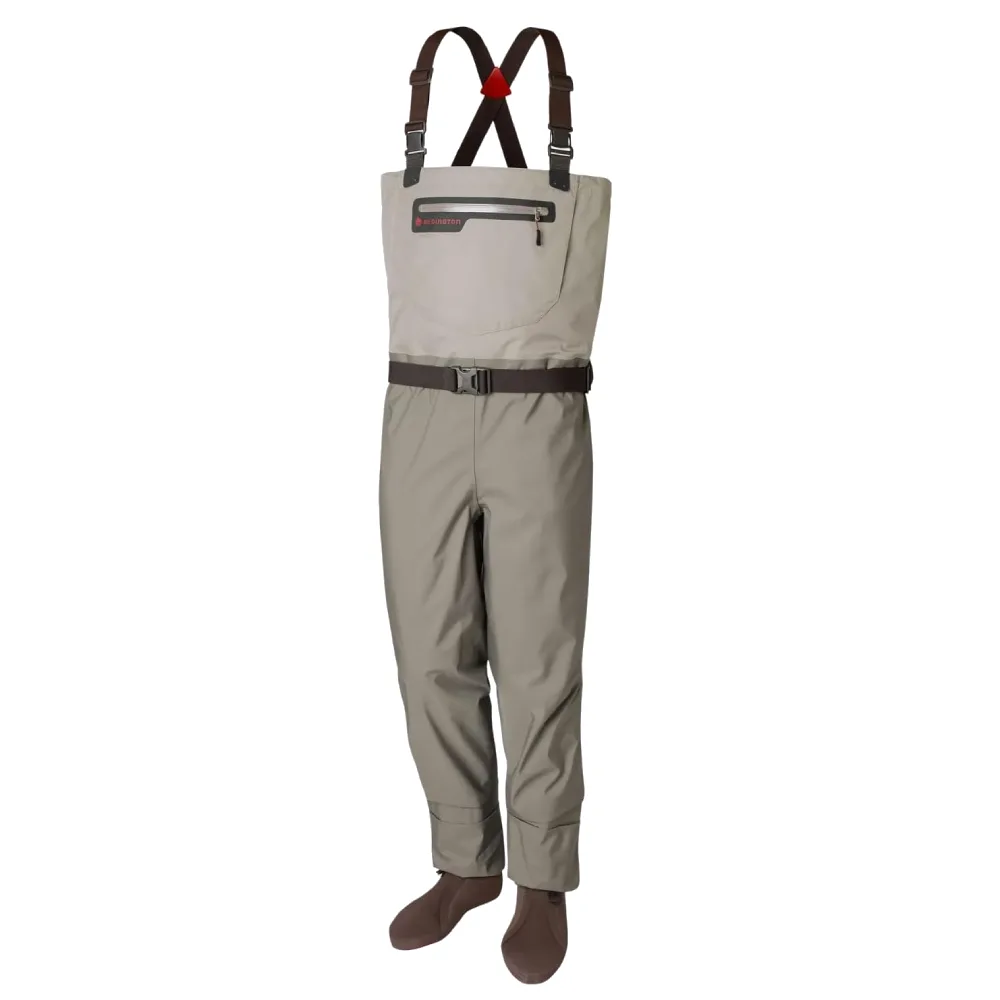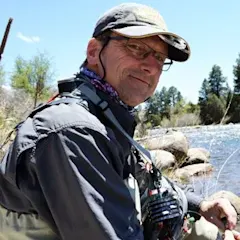We may earn revenue from the products available on this page and participate in affiliate programs. Learn more
Fishing waders are indispensable gear for any angler who’s not climbing into a boat or fishing off of a dock. They get you into water you couldn’t reach from shore, or with hip waders. They keep you warm, provide protection from rain, and require very little maintenance. And these days, they’re tougher and more lightweight than ever before. There are so many waders available now that it can be hard to choose the right pair for your style of fishing. Here’s a look at the best fishing waders out there and how to zero in on the best type for you, according to our angling experts.
Best Overall: Simms G3 Guide Stockingfoot Wader
Best Budget: Frogg Toggs Canyon II Stockingfoot Wader
Best Neoprene: Hodgman Caster Neoprene Cleated Bootfoot Wader
Best for Women: Orvis Women’s Ultralight Convertible Wader
Best Zip-Front: Redington Escape Chest Wader
Best Overall: Simms G3 Guide Stockingfoot Wader
Pros
Breathable Gore-Tex
Cozy handwarmer pocket
Available in bootfoot and stockingfoot options
Cons
No gravel guard hooks
This wader’s Gore-Tex Pro Shell (three-layer upper, four-layer legs) wicks out perspiration to keep you cooler in the summer and warmer in the water. Between the top-access zippered stretch pocket, the retractor docking station and tippet spool sleeves, you might not even need a vest or pack, and you’ll appreciate the fleece-lined hard-warmer pocket on cold days. The foot-shaped neoprene booties come with an anti-funk microbial finish. The G3 comes in a bootfoot model, too. If you do go for the stockingfoot, you’ll need wading shoes, and Simms makes tons of great models.
Best Budget: Frogg Toggs Canyon II Stockingfoot Wader
Pros
Waterproof neoprene
Budget-friendly price
Adjustable belt and suspenders
Cons
Not as durable as other options
Sizes run large
Frogg Toggs has prided itself on providing good value since its launch in 1996, and the company has a loyal following. The Canyon II wader features a zippered pocket, an adjustable belt, gravel guards, a flip-out security pocket, and nice, sturdy 4mm neoprene booties.
Best Neoprene: Hodgman Caster Neoprene Cleated Bootfoot Wader
Pros
Double reinforced knees
Very warm neoprene
Studded cleats for stability
Cons
Not as breathable
Every other wader in this list is breathable, but many cold-water anglers and waterfowlers swear by thick, stretchy neoprene. They don’t wick away moisture and they’re more challenging than breathables to pull on, but for sheer insulating power, neoprene is hard to beat. The knees are double-reinforced, there are storage and hand-warming pockets, D-rings on the front and back accommodate a net or wading staff, and—importantly—the studded cleats can help prevent a fall into dangerously cold currents.
Best for Women: Orvis Women’s Ultralight Convertible Wader
Pros
Convertible
Plenty of pockets
Neoprene gravel guards for extra durability
Cons
Booties run small
Only in recent years have women finally had an option besides wearing waders cut for men. A good pair of women’s waders will usually have a belt and a chest panel that sit a bit higher. And the waders simply fit better than men’s waders, which are usually so baggy that they’re distractingly uncomfortable and limit a female angler’s range of movement with excess folds of heavy fabric.
Orvis is serious about welcoming more women to fishing, and designing waders for female anglers is part of the effort. The Ultralight Convertible Wader uses magnetic fasteners to easily convert from chest-high to waist-high for comfort on warm days, and the gusseted crotch design allows for better range of motion than many women experience in men’s waders. You can carry fly boxes, extra tippet and your phone in the internal and external pockets. There’s a tool dock on the front, and a patch where your fly can dry while you’re trying the next one. Neoprene gravel guards to keep pebbles out of your boots are a nice touch.
Best Zip-Front: Redington Escape Chest Wader
Pros
Breathable and waterproof
Lots of added features like pockets, D-rings, and tool docks
Convenient zip-front design
Cons
Less durable than other options
Redington has delivered a breathable zippered wader that costs half of what such a model used to. Other amenities include micro-fleece-lined hand-warmer pockets, a design built to not to catch on oars, gravel guards with shoelace hooks, and a D-ring at center back to hang your net.
What To Consider When Choosing Fishing Waders
Style
Stockingfoot waders are just that and require separate wading boots. Because they fit your feet well and provide ankle support, they provide sure-footedness wherever you wade. Many anglers prefer stocking foot waders for one important reason: Wading boots offer much better support and comfort compared to boot-foot waders. They feel and look like hiking boots, make long treks to the water more pleasant, and wading stony riverbeds safer. While you’ll have to buy wading boots, the additional cost is well worth the additional sure-footedness.
Bootfoot waders are the traditional wader style. These are easier to put on and take off, don’t require separate wading shoes, but tend to have a looser foot fit than stockingfoot waders. Breathable waders are very comfortable, while neoprene waders keep you warm in cold water. Some waders have flies—a decided advantage for men when nature calls.

Price
It’s possible to buy a pair of chest waders for around 30 bucks, but it’s probably not a good idea. Clothes that will keep you dry for hours while standing in rushing water cost a fair amount to design and make, and you can’t really expect decent quality waders for that price. But you can spend less than $100 and get no-frills waders that fit comfortably and don’t leak.
Your best clue about finding waders that get their primary job done is to buy a top brand. If a brand is mentioned often in social media, has a strong advertising presence, and offers a wide range of products and price points, chances are you can trust it. Then look for the features you need. The more plies, the better, and if you’re going to fish very cold water, 4mm booties will make you happier than thinner ones.
Prices vary, with the more expensive waders offering more features such as pockets and reinforced sections. But even the most expensive waders are much cheaper than a boat.
Material
Waders keep you dry, but they keep you warm. How warm they keep you depends on what kind you wear and what you wear underneath them. A good pair of performance-fabric long johns and fleece pants underneath breathable waders will keep you comfortable.
Still, neoprene is a substantial fabric with better insulation. A pair of 3mm neoprene waders will keep the chill away without adding too much bulk. But if you’re dealing with really cold conditions, the thicker 5mm models might be what you need. Neoprene is also a bit more puncture-resistant than breathable fabric, but flies and prickers can still do damage, so be careful. And be prepared for a big of clamminess, the thing that breathable waders banish. But that’s still better than shivering uncontrollably while you wait for that big steelhead to finally bite.
FAQs
Q: Are stockingfoot waders better? Bootfoot waders are easy to pull on and off. But the great majority of fly anglers, who almost always wade unless they’re fishing from a boat, prefer the stocking foot style. Yes, it means buying and using another piece of equipment, a pair of wading shoes. For many, the great ankle support makes stockingfoot worthwhile.
Wading shoes come in a wide range of designs, including BOA tighteners instead of laces, and offer felt, sticky rubber, and studded soles for wading safety. If you fish very cold water or sandy beaches, bootfoots might be better, but in most other situations, stockingfoots will give you a more pleasant experience.
Q: How do I know what size wader to get? Wader makers have their own size guides, some more exacting than others. Simms, for example, lists 11 sizes and with three inseam lengths for the G3 Guide Wader, along with instructions on how to measure for the best fit. Redington lists an extensive size chart that takes chest, waist, inseam, and shoe size measurements into account.
Skinny jeans might look sharp when you’re out on the town, but you don’t want to feel constricted while fishing, so round up rather than down. Finding the right size is actually trickier with wading shoes. It’s hard to know exactly which size will be comfortable but supportive over your warm socks and neoprene booties. If you buy in person, try the shoes on over your waders’ feet and make sure they are comfortable. If you buy online, be willing to ship them back if the fit’s not perfect.
Q: Are expensive waders worth it? You get what you pay for. If you can afford top-of-the-line Simms or Orvis, they’ll fit great and can be expected to last several seasons. But even the best waders don’t last forever. Some anglers just accept that their waders will wear out or be damaged after one or two seasons and buy cheap for that reason. If you only fish a few times a year, an inexpensive wader may last you five years or more. If you punish your gear every weekend, you may be shopping again in a season and a half.
Final Thoughts
Waders add to the fishing experience. The push of the current or the waves on your legs makes you feel part of the environment, and the freedom of movement and access to the fish that waders make possible is bound to help your fishing. And being dry and comfortable lets you fish longer and better. If you’re thinking of getting a pair, by all means—come on in, the water’s fine.
Why Trust Us
For more than 125 years, Field & Stream has been providing readers with honest and authentic coverage of outdoor gear. Our writers and editors eat, sleep, and breathe the outdoors, and that passion comes through in our product reviews. You can count on F&S to keep you up to date on the best new gear. And when we write about a product—whether it’s a bass lure or a backpack—we cover the good and the bad, so you know exactly what to expect before you decide to make a purchase.

